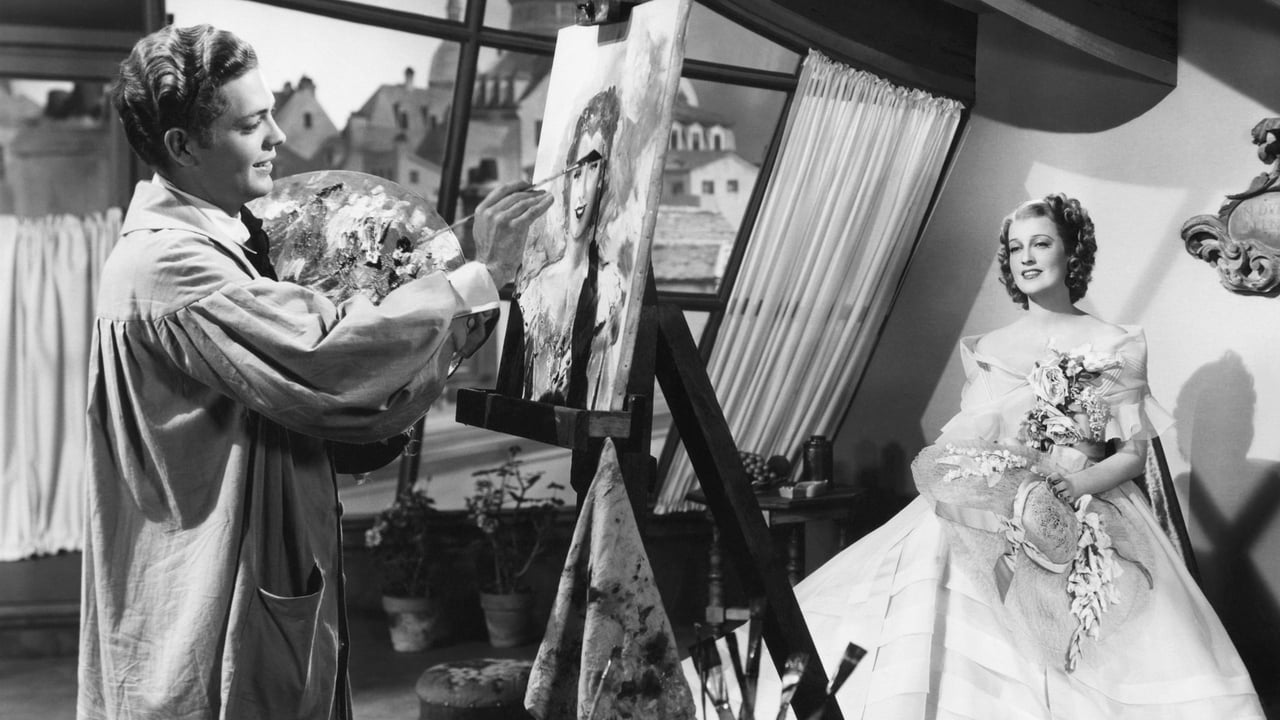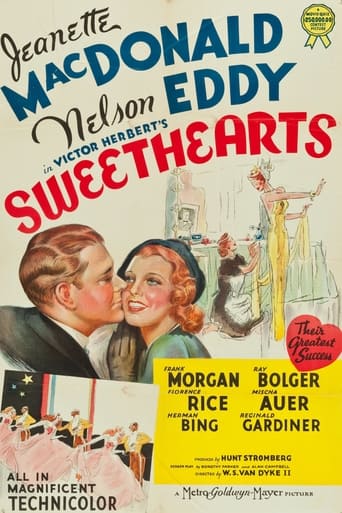

The film that started it all — the first of MGM's fabulously Technicolored musical comedies — and still one of the studio's Ten Best! A wittily diverting script, beautifully photographed, joined to Victor Herbert's "immortal melodies", enacted by a grand array of our favorite character players including Frank "Kiddies" Morgan and Herman "Budapest" Bing.MacDonald and Eddy were never more captivating or brightly presented, Van Dyke's pacey direction moves with a fluent slickness, production values are enjoyably lavish, while Slavko Vorkapich has created a remarkably inventive montage — a rare (perhaps unique?) accomplishment from the meticulously slow-working Technicolor laboratory. Sets, costumes are also exceptionally attractive in color, setting new standards for appealing opulence. In addition to all this visual gloss — and other smoothly professional technical credits including able sound recording and brisk film editing — there's that delightfully quip-witted, gently satirical Parker- Campbell script that provides such wonderfully comic opportunities for our gang of scene-stealing veterans. Playing their volatile roles with commendable enthusiasm and pungent relish, Morgan, Auer and Bing make merry with hilarious bickering, while Reginald Gardiner almost steals the show as a cynically persuasive Hollywood agent. In smaller parts, Walburn and Watson are delightful, Gene Lockhart has an amusingly memorable cameo and I must especially applaud Betty Jaynes and Douglas McPhail as the duplicate "Sweethearts".MacDonald and Eddy are not only in excellent collective voice, but for once are evenly matched — musically and dramatically. Eddy shares equally with MacDonald in most of their numbers except "Every Lover Must Meet His Fate" in which her participation is comparatively brief. However, he has a rousing solo, "On Parade", virtually to himself. MacDonald, on the other hand, is considerably up-staged by Ray Bolger (who, in this film — unlike his previous role in Rosalie — has nothing else to do but dance) in "Wooden Shoes". Both have ingenious production numbers and Eddy's dramatic gifts, which ran more naturally to light comedy than old-fashioned opera melodrama, are buoyantly serviced by the sprightly tattle-tale script. Although she preferred more dramatic roles, Jeanette MacDonald's "singing sweetheart" is no less charmingly vivacious. And both stars are handsomely served by Technicolor.I was going to conclude by observing that it was a shame MacDonald and Eddy didn't make more out-and-out comedies. But of course they did try again with "I Married An Angel" (1942), their final collaboration, which was not nearly so commercially successful. (It's a pity that you could only use the Campbells' ingenious show-within-a-show idea once. It was certainly a mighty clever way of jettisoning a creaky old operetta story while retaining its magnificently vibrant songs).
... View More"Sweethearts" has so much going for it that it's painful to admit to some lesser Victor Herbert songs as main features. Eddy and MacDonald are fine, the Technicolor is lovely, and the cast is top notch. Unfortunately, there are only about two songs that are worthy of the great Herbert.Well, every composer can't turn out all hits; it's just unfortunate that the lesser songs are given such up front treatment. As much as the stars pour their all into these songs, they fall rather flat and unmemorable.The production numbers are spectacular, the production design lovely, and the costumes eye-popping. Too bad this one didn't rise to the level of the duo's other film entries. Still, kudos to the quality of both the singing and acting of Eddy-MacDonald.
... View MoreSweethearts is the first of two of the Jeanette MacDonald/Nelson Eddy films to be done in technicolor, the second at last being Bittersweet. It is also the first MGM film done in modern technicolor, though in Jeanette's The Cat and the Fiddle, the last 10 minutes were in color. And it is the only one of their films besides Bittersweet where they start off as man and wife.The original operetta by Victor Herbert was done in 1913 and it was in fact a story set in Holland as the numbers do show. But this film is like the later one Nelson did with Rise Stevens, The Chocolate Soldier, in that he and Stevens are husband and wife appearing in The Chocolate Soldier while the plot of that is taken from Ferenc Molnar's The Guardsman.Sweethearts has an original script by Dorothy Parker and it involves two happily married singing co-stars of a long running operetta, named Sweethearts. They've been appearing on Broadway for seven years in the same show.In fact a whole cottage industry has grown up around Sweethearts. Producer Frank Morgan, songwriter Herman Bing, librettist Mischa Auer have had it real good for seven years. They've been quite content to live off the box office of Sweethearts as long as MacDonald and Eddy keep appearing. Also the extended families of both Eddy and MacDonald live off of them as well.When Reginald Gardiner woos them on behalf of Hollywood producer George Barbier, panic ensues among the ranks of the cottage industry. These people might actually have to go to work.Knowing Dorothy Parker wrote 50% of the script, you can imagine it is a witty one. Jeanette and Nelson are in good voice and the musical calls for a large number of duets. They sing the title song, For Every Lover Meets His Fate, and an interpolated non Victor Herbert song, Our Little Grey Home in the West in anticipation of their California excursion. In addition Jeanette sings A Summer Serenade which was originally an instrumental Victor Herbert composition entitled Badinage. Robert Wright and Chet Forrest gave it some lyrics for the film. Nelson has a good typical Nelson marching song in On Parade.After appearing with Nelson Eddy in Rosalie as a sidekick Ray Bolger didn't have as many scenes, but got to show his dancing talent a lot more in the Wooden Shoes number. Jeanette personally interceded with Louis B. Mayer and got Douglas MacPhail and Betty Jaynes cast as their understudies.MacPhail and Jaynes married later on, but divorced after MacPhail's career took a nosedive in the early Forties. He was a good singer who you might remember appeared with Mickey Rooney and Judy Garland in Babes in Arms and later introduced the Cole Porter classic, I Concentrate on You in Broadway Melody of 1940. Tragically he took his own life after the divorce for God only knows what reasons.For Jeanette and Nelson fans and for those who like to see Ray Bolger in something else besides The Wizard of Oz, Sweethearts in highly recommended.
... View MoreIn glorious Technicolor,the stars are probably at their best,exceeding such romances as "New Moon","Rose Marie" and the others. Production values are enormous,beginning with a dance by Ray Bolger to a Dutch background heightened in color by beds of tulips.They are just enough not to be overwhelming. Jean and Nelson are the stars in the film of the sixth year of the stage production of Victor Herbert's 1913 show "Sweethearts" and are being done to death by the importunities of radio,recording,and family demands. Frank Morgan is his usual perplexed and harassed self as the stage producer,Herman Bing and Misha Auer are in top form as a mutually fighting conductor and wannabe playwright. One delightful vignette is during her modelling session at a dressmaker's shop,where she shows off the various colors and styles for different occasions. One gem is Eddy's race,pursued by speed cops,in a taxi from recording studio to NBC radio (looking much then as now) where Jeanette awaits him,having just broadcast Herbert's "Badinage" ably accompanied with much panache by Dalies Frantz.Some of her old Lubitsch (Director "Merry Widow"et al.) sassiness comes out as she mimes with the audience, until Eddy arrives, looking like a naughty schoolboy,with sleeve pulled up arm' amid her tidying of his appearance. One of the nicest shots is down the staircase at their home during the duet of "Little Gray home in the West",one of the most sincere performances. Herbert Stothart deserves much credit for his arrangement of Herbert's melodies,the duets and the delightful continuous orchestrations of the sound track. I would certainly watch this masterpiece several times.
... View More